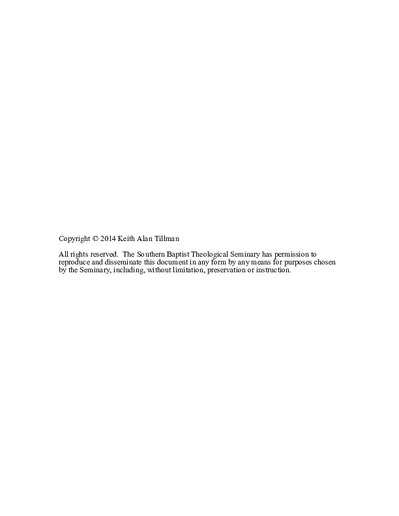"He Worked Out His Salvation with Fear and Trembling": The Spirituality of John Ryland, Jr.
Subject
Ryland, John, 1753-1825Huntington, William, 1745-1813
Antinomianism
Spirituality
Calvinism
Theology, Doctrinal
Description
Th. M., Southern Baptist Theological Seminary, 2014
Abstract
This thesis explores the spirituality in John Ryland, Jr.'s life, ministry, and writings. It examines the antinomian controversy within the Particular Baptists of the eighteenth and nineteenth centuries, focusing on the teaching of William Huntington, a key proponent of antinomianism. It seeks to answer the questions of what influence John Ryland had on the antinomianism controversy and how his theology of the law and the gospel affected his own piety.
Chapter 1 is the introduction of the thesis. It presents the main research question concerning the spirituality of John Ryland, as well as introduces the secondary questions concerning the influences of Ryland's piety and the legacy that he left. This chapter also makes the case for the importance of a study of John Ryland's life and ministry as it pertains to his spirituality.
Chapter 2 examines John Ryland's life, ministry, and relationships, especially those relationships that helped shape his spiritual life. It includes detailed information concerning his family, especially his father John Collett Ryland, as well as his personal relationship with John Newton.
Chapter 3 focuses on the antinomian controversy that affected the British Particular Baptists. It details the controversy by offering an historical biography of William Huntington and by examining Huntington's writings.
Chapter 4 discusses Ryland's conflict with Huntington and, through sermons and letters, examines Ryland's thoughts concerning antinomianism. It also examines Ryland's thoughts concerning the law and the gospel and the influence this had on his spirituality.
Chapter 5 is the conclusion, and it summarizes the presented arguments in order to answer the research question. It also presents key benefits of this study for the modern Baptist church and shows how Ryland's work continues to impact churches and missionaries of the twenty-first century.

